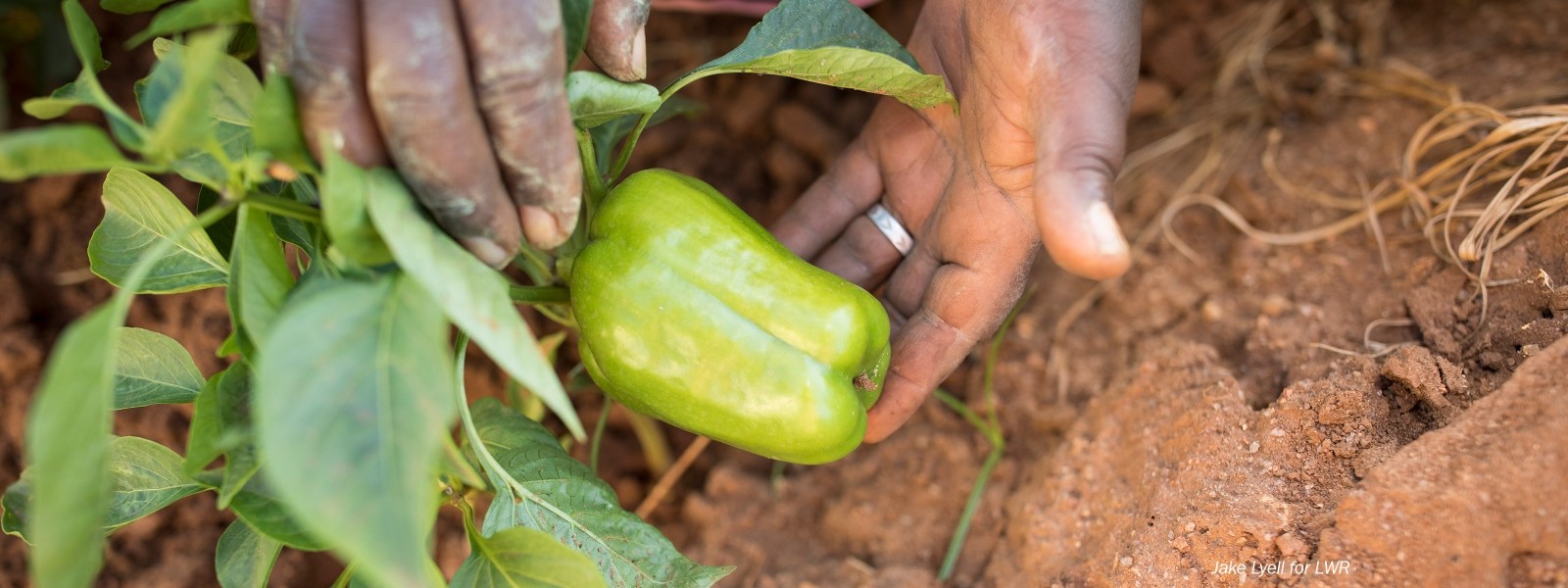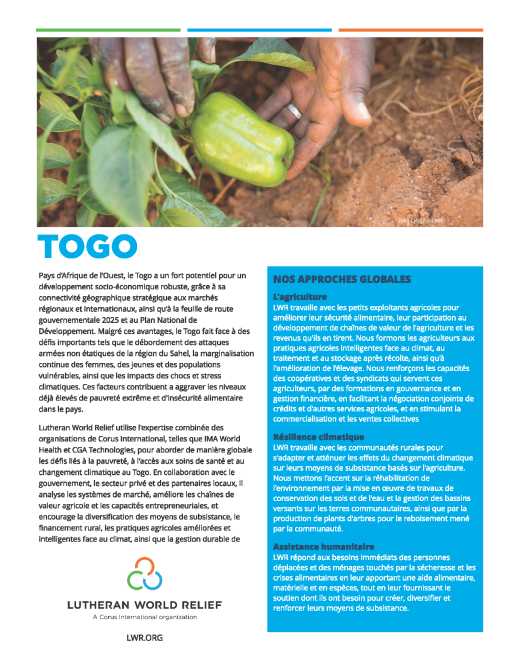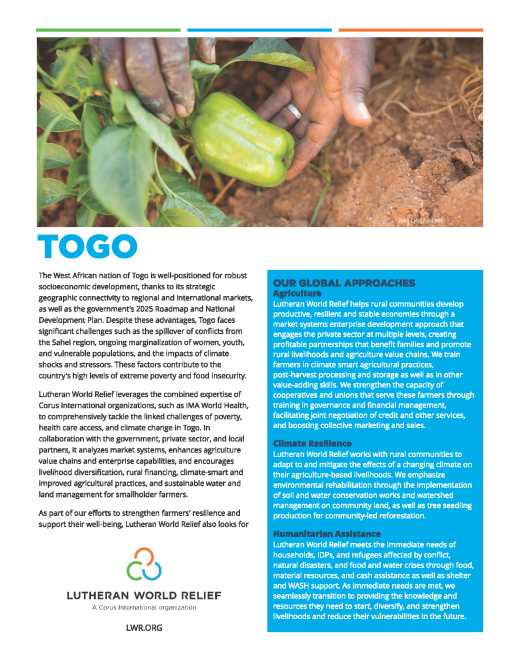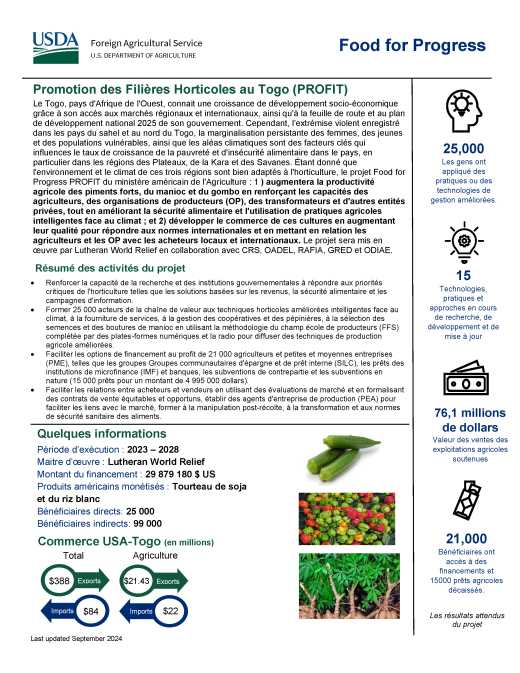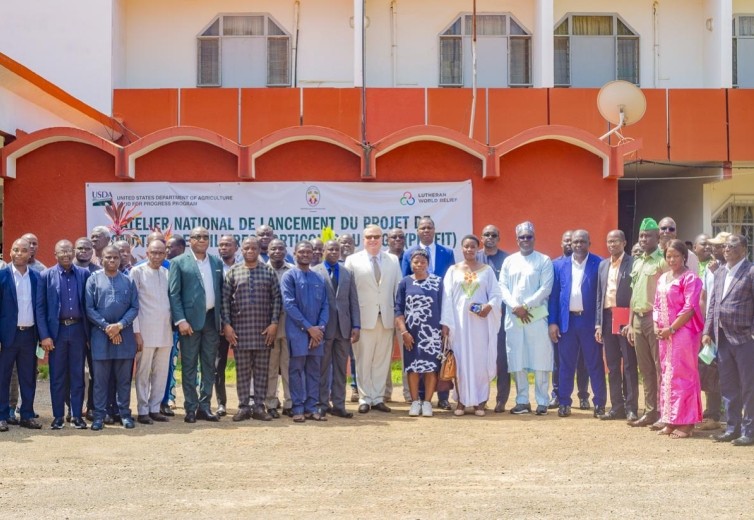The West African nation of Togo is well-positioned for robust socioeconomic development, thanks to its strategic geographic connectivity to regional and international markets, as well as the government's 2025 Roadmap and National Development Plan. Despite these advantages, Togo faces significant challenges such as the spillover of conflicts from the Sahel region, ongoing marginalization of women, youth, and vulnerable populations, and the impacts of climate shocks and stressors. These factors contribute to the country's high levels of extreme poverty and food insecurity.
Lutheran World Relief leverages the combined expertise of Corus International organizations, such as IMA World Health, to comprehensively tackle the linked challenges of poverty, health care access, and climate change in Togo. In collaboration with the government, private sector, and local partners, it analyzes market systems, enhances agriculture value chains and enterprise capabilities, and encourages livelihood diversification, rural financing, climate-smart and improved agricultural practices, and sustainable water and land management for smallholder farmers.
As part of our efforts to strengthen farmers' resilience and support their well-being, Lutheran World Relief also looks for opportunities in Togo to apply IMA World Health's experience in treating and preventing diseases, responding to and mitigating violence against women and girls and improving maternal and child health.
PROJECT HIGHLIGHTS
The U.S. Department of Agriculture’s Food for Progress PROFIT Project increases agricultural productivity for hot peppers, cassava, and okra by strengthening the capacity of 25,000 farmers, producer organizations (POs), processors and other private entities, while improving food security and the use of climate-smart agricultural practices. It also expands trade of these crops by increasing their quality to meet international standards and connecting farmers and POs with local and international buyers. Lutheran World Relief implements the project in collaboration with CRS, OADEL, RAFIA, GRED, and ODIAE in Togo’s Plateaux, Kara and Savanes regions.
The project will strengthen the capacity of research and government institutions to address critical horticulture priorities such as revenue-based solutions, food safety, and informational campaigns. It will also train 25,000 value chain actors in improved horticultural climate-smart agriculture techniques, service provision, cooperative and nursery management, seed selection, and cassava cutting utilizing the Farmer Field School (FFS) methodology supplemented by digital platforms and radio to disseminate improved agricultural production techniques. Finance options will be facilitated to benefit 21,000 farmers and small and medium enterprises (SMEs), such as Savings and Internal Lending Community (SILC) groups, microfinance institution (MFIs) and bank lending, and in-kind matching grants (15000 loans for $4 995 000). PROFIT will also promote buyer-seller relationships through the following means: use market assessments and formalization through fair and timely sales contracts, establish Producer Enterprise Agents (PEAs) to facilitate market linkages, train on post-harvest handling. processing, and food safety standards.
The Corus Effect
Lutheran World Relief is part of Corus International, an international development organization that unites an array of nonprofit organizations and businesses, each with specialized expertise — from health to technology to economic development to emergency response. Alongside communities and local partners in fragile settings, our expert teams integrate disciplines, approaches and resources to overcome poverty and suffering for those living in the world’s toughest and most difficult circumstances. Our traditional and nontraditional approaches bring together the multi-dimensional, holistic solutions needed to truly achieve lasting change.
Corus features global public health leader IMA World Health, international development and aid organization Lutheran World Relief, technology for development consultancy CGA Technologies, impact investing firm Ground Up Investing, and direct-trade company Farmers Market Brands.


